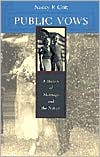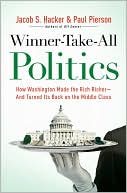Public Vows: A History of Marriage and the Nation
Search in google:
We commonly think of marriage as a private matter between two people, a personal expression of love and commitment. In this pioneering history, Nancy F. Cott demonstrates that marriage is and always has been a public institution. From the founding of the United States to the present day, imperatives about the necessity of marriage and its proper form have been deeply embedded in national policy, law, and political rhetoric. Legislators and judges have envisioned and enforced their preferred model of consensual, lifelong monogamy a model derived from Christian tenets and the English common law that posits the husband as provider and the wife as dependent. In early confrontations with Native Americans, emancipated slaves, Mormon polygamists, and immigrant spouses, through the invention of the New Deal, federal income tax, and welfare programs, the federal government consistently influenced the shape of marriages. And even the immense social and legal changes of the last third of the twentieth century have not unraveled official reliance on marriage as a "pillar of the state." By excluding some kinds of marriages and encouraging others, marital policies have helped to sculpt the nation's citizenry, as well as its moral and social standards, and have directly affected national understandings of gender roles and racial difference. Public Vows is a panoramic view of marriage's political history, revealing the national government's profound role in our most private of choices. No one who reads this book will think of marriage in the same way again. Publishers Weekly Marriage, both as a private contract and a public institution, has profoundly affected national policy since the earliest days of the republic. In this exhaustively researched study (reference notes occupy 80 of its 288 pages), Cott, the Stanley Woodward professor of history and American studies at Yale, posits a monolithic Christian monogamous marriage, formed by the mutual consent of a man and a woman, as American colonists' model. This model, she argues, was congruent with the political ideal of representative government: the Constitution's "more perfect union" was likened to the domestic ideal of marital union. Entry to marriage, Cott observes, has been regulated by the states, which have also used their power to limit this civil right. Before the Civil War, in slaveholding states, slaves had no access to legal marriage, while long after the war, mixed marriages between whites and African-Americans, or whites and Asians, were prohibited in many states. The U.S. government's (losing) legal battle against the Mormon practice of polygamy has been another continuing saga in U.S. social history. Cott cites the current prevalence of divorce, same sex couples seeking legally recognized unions, and new interpretations of the roles of husband and wife as factors that portend further changes in the social landscape. Though her subject is a fascinating one, and Cott has a sterling reputation that will draw women's studies devot es, her densely packed prose and lengthy paragraphs make this book most appropriate for serious students of U.S. social history. (Jan.) Copyright 2000 Cahners Business Information.
Introduction 1. An Archaeology of American Monogamy2. Perfecting Community Rules with State Laws3. Domestic Relations on the National Agenda4. Toward a Single Standard5. Monogamy as the Law of Social Life6. Consent, the American Way7. The Modern Architecture of Marriage8. Public Sanctity for a Private Realm9. Marriage Revised and Revived NotesAcknowledgmentsIndex








